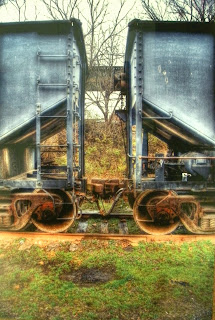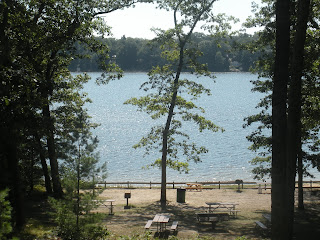Hiking trail, Saugatuck Dunes State
Park
Dear
George,
Katja
and I have driven back and forth between Cincinnati and the Mackinac Bridge in
northern Michigan innumerable times since the 1960’s, but we always took I-75
through the center of the state so we had no experience with the Lake Michigan
coast. In 2007 we finally decided
to remedy that by taking a camping road trip there with our sheepdogs, Mike and
Duffy. Unfortunately our departure
was scheduled shortly after the eastern U.S. was inundated by Hurricane Dean,
one of the strongest hurricanes on record. The Midwest weather forecast predicted constant
post-hurricane rain for the next week to ten days, but we had packed our car,
Katja had applied for vacation time, and we doubted they could really predict
weather a week in advance. We
were, of course, badly mistaken.
It rained virtually nonstop and cast a pall over our entire trip. If I remember correctly, I think Katja
vowed she would never go camping again.
In any case, it's been on my mind ever since to redo that Lake Michigan
trip under more pleasant circumstances.
This is the first year that our bad memories seem to have faded
sufficiently to give it another try, and so we headed north a week and a half
ago.

Campsite #110 at Holland State Park
We
drove from Cincinnati to Holland, Michigan, via Highway 31 on Thursday, Sept.
5, arrived at the Holland State
Park in the late afternoon, and found a good campsite in a pine forest. Katja said Holland was the most
attractive city she’s ever seen.
We only planned to stay at the park for two nights, but we liked it so
much we stayed for four, taking day trips to resort communities along the coast
to the north and the south. Katja
was a hardy camper and barely complained when her air mattress completely
deflated on the first night out.
Nonetheless, I hurried to Wal-Mart and bought a new one.
Looking straight upward at our
campsite
Michigan
was enticing because we were constantly surrounded by water, cool temperatures,
clean air, beaches, and pine trees.
In contrast to our earlier trip, the weather was near perfect –
typically sunny with highs in the mid-70’s. What a great state!
Lake Macatawa
Our
campground was located along the shore of Lake Macatawa, a 1700 acre lake
adjacent to the city of Holland. A
channel connects Lake Macatawa to Lake Michigan, enabling Great Lakes boaters
to dock at one or another of the marinas there.
At the dock at Lake Macatawa
We
saw lots of splendid boats at Holland and at other marinas up and down the
coast.
Katja and Captain Sundae
We
discovered Captain Sundae's softserve parlor on our first night in
Holland. Katja said that her Tommy
Turtle was the best sundae she'd ever had in her life. Here she is with the Captain
himself. They seem to make sundaes
much larger in Michigan than in Ohio, and we partook nearly every day, turning
this into a Softserve Sundae Vacation.
Kalamazoo Lake at downtown Saugatuck
With
cool temperatures at night, I picked up a handsome Old Navy sweatshirt for $2
at a yard sale in Holland on Friday morning. Then we drove to Saugatuck, an art colony and popular
tourist destination just south of Holland. Lots of boats, boutiques, art galleries, restaurants, and
bed and breakfasts. A totally
appealing place to wander about, window-shop, and people-watch.
Lunch on the lawn
We
enjoyed lunch on a restaurant lawn next to the marina in Saugatuck.
On the riverwalk in Grand Haven
The
next day we drove north to Grand Haven, another popular tourist destination
along the lake shore. The Grand
River runs passes by at the foot of the downtown business district, and the
riverwalk offers scenic views.
Katja bought us each a Grand Haven sweatshirt.
Along the Grand River
There
were still plenty of flowers blooming in Grand Haven in early September.
Strolling around Washington Ave.
Washington
Avenue’s historic district has plenty of shops, galleries, restaurants, and
flower-covered bicycles. We even
saw four goats and a pot-bellied pig on one of the side streets.
Mike and Duffy meet Chloe
In
downtown Grand Haven we met five-year-old Chloe, the first Bedlington Terrier
we've seen in person since we lost our beloved Winston over twenty years ago.
At Duck Lake State Park
There
were lakes scattered all throughout the region. On Sunday we stopped at Duck Lake for a picnic lunch on our
way to Pentwater.
Pentwater Lake
Pentwater
is another favorite tourist spot, located on Lake Michigan and on Pentwater
Lake about 75 miles north of Holland.
Katja bought a Pentwater sweatshirt to go with her Grand Haven
sweatshirt. By then we were
well-equipped with sweatshirts. We
looked over a local real estate guide.
Summer homes on the shore ran from $300K to $2.6 million.
String band in downtown Pentwater
We
came upon an 8-member string band playing bluegrass music on a street corner in
downtown Pentwater. All but one
were senior citizens, and one man could have been my father’s twin brother. We were told the group plays there
every Sunday afternoon, and they were good enough that they might have appeared
on Prairie Home Companion. It
brought a tear to my eye. On the
way back we picked up some blueberries and watermelon at a big farm
market.
Lake Michigan at Ludington State Park
On
Monday we packed up our gear and headed north for Ludington State Park, a few
miles north of the city of Ludington.
I'd read that Ludington is regarded by many as the best state park in
the Midwest. That's because of its
magnificent location on the shore of Lake Michigan, with hilly dunes and wide
sandy beaches that reminded us of the Atlantic seashore. The lake was gorgeous; blue water,
white surf; sea gulls; fishing boats and pleasure craft; lighthouses; swimmers
and sunbathers; kids playing in the sand; even a para-glider pulled by a power
boat.
Lake Michigan from the dunes
This
lake view is right over the dunes from our campsite, about thirty yards away
from our tent.
Native fauna
Mike
and Duffy came with me to gather some kindling for a campfire, and we ran
across three white-tailed deer at the edge of the forest. The dogs were only mildly interested,
and the deer seemed equally calm about our encounter.
Night-time tent interior
Being
together in the tent at night is one of my favorite things about camping. It’s filled with mystery (as this photo
of lantern and blanket indicates).
Downtown Manistee
Katja
spent part of Tuesday a.m. on the Lake Michigan beach, enjoying the sunshine
and reading her book, “Rafa”. Then
we took a sightseeing trip to Manistee, a coastal town of about 6,000 which
became a permanent European-American settlement in 1841. On the way there we
had lunch at Culver’s which has the best frozen custard the world has ever seen. Like most towns in the area, Manistee’s
architecture dates back to the late 1800's and houses lots of interesting
shops. Katja got a book on “Word
History” at the used book store on Water St.
The Manistee River
We
took a relaxing stroll on the boardwalk along the pretty Mainstee River in
downtown Manistee.
Mike at the motel
After
a rainy night at the campground, we packed up on Wednesday morning, enjoyed
breakfast at the House of Flavors in downtown Ludington, and then set out for
Ann Arbor for an intended two-night camping stay. However, we got stuck for three hours in a massive traffic
jam on the Interstate, and it started raining as well. My gas gauge dropped from a quarter
tank to “Empty” as we sat in the stranded traffic, and we got very nervous. Even though I had long claimed
that there were no motels in the United States that would accept two large
sheepdogs, we found one as soon as we finally reached an exit. Though it violated my Spartan camper
principles, we humans and dogs did appreciate the luxuries of air conditioning,
showers, firm mattresses, and Wheel of Fortune on cable TV.
At Zingerman's Deli
We
spent several hours checking out Ann Arbor’s downtown and campus areas on
Thursday. School was in session,
and Ann Arbor looked busy and prosperous.
We stopped for lunch at Zingerman's Deli in Kerrytown, our favorite Ann
Arbor destination in recent years.
They have a dog-friendly patio.
I was a little nervous because Mike had vomited on the floor of the only
other dog-friendly patio we've ever visited. I decided, though, that that was a one-time freak
occurrence. Wouldn't you know,
we'd just settled in when Mike promptly vomited up his entire breakfast on
Zingerman's floor, right the feet of a nice couple who had befriended him. I cleaned it up as best I could, and
the sunshine dried up the rest.
We
headed for home from Zingerman’s and used Katja's smartphone to guide us to a
Dairy Queen in Wapakoneta, OH.
After four hours on the road we reached the Cincinnati city limits. As always, it was sad to wind up an
enjoyable trip, but also pleasing to be home again. I’d say Michigan’s west coast is about the most enjoyable
travel destination we’ve been to in the Midwest. I carefully packed up all our gear the next morning and stored
it in the basement. But it's ready
to go at a moment's notice.
Love,
Dave
G-mail Comments
Jennifer M
(9-17): Great photos and great
trip! Also -- Holland, MI really
is Dutch!
















































































































































































































